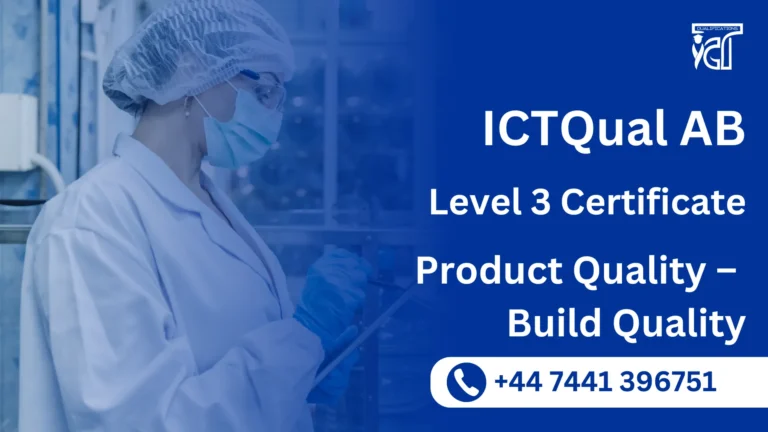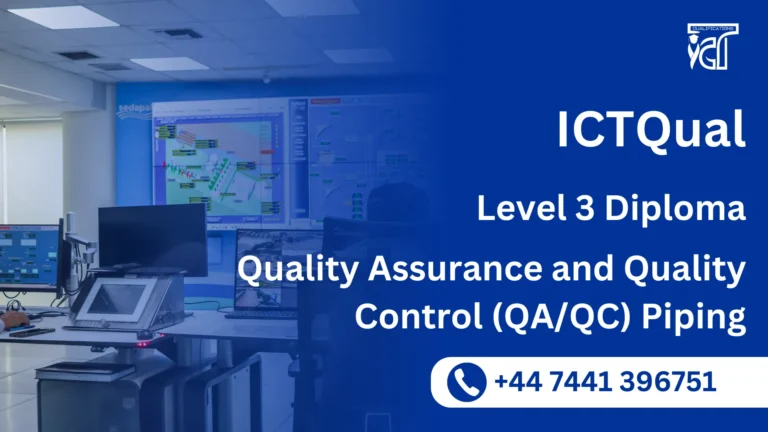In today’s fast-paced business environment, acquiring the right skills and qualifications is vital for individuals aiming to progress in management roles. The ProQual Level 3 Diploma in Management is an OFQUAL regulated qualification designed to equip learners with the essential management knowledge and practical skills necessary to excel in supervisory and junior management positions. This qualification is recognized for its comprehensive and flexible approach, providing learners with the tools needed for effective decision-making, leadership, and management in a wide variety of organizational settings.
The ProQual Level 3 Diploma in Management is a prestigious qualification accredited by OFQUAL (The Office of Qualifications and Examinations Regulation), ensuring that the qualification meets high standards of quality and relevance in the business world. Aimed at individuals who are already in or aspiring to a management role, this qualification helps to develop key managerial competencies, including communication, problem-solving, leadership, and performance management.
As an OFQUAL regulated qualification, the ProQual Level 3 Diploma in Management adheres to the high standards set by the UK Government’s regulatory body. This guarantees the quality, reliability, and recognition of the qualification within the UK and globally. Whether you are looking to advance in your current career or explore new management opportunities, this qualification will be a significant asset.
The ProQual Level 3 Diploma in Management is designed to offer maximum flexibility, allowing learners to progress at their own pace. This qualification can be studied online or through in-person training, making it ideal for busy professionals who want to enhance their career prospects without interrupting their work schedule.
The ProQual Level 3 Diploma in Management is an excellent choice for those looking to advance their career in management. With its OFQUAL regulated status, practical assignments, and comprehensive curriculum, this qualification provides the essential skills and knowledge required to excel in managerial positions. Whether you’re a new manager or aiming for career progression, this qualification will equip you with the tools to manage teams, resources, and projects effectively, positioning you for success in today’s competitive business environment.
ProQual Level 3 Diploma in Management
Candidates must achieve 55 credits:
- 31 credits from the Mandatory units in Group A, plus
- a minimum of 17 credits from Optional Group B
- a maximum of 7 credits may be from Optional Group C
Group A Mandatory Units
| Sr# | Unit Title | Credit Value |
|---|---|---|
| 1 | Manage team performance | 4 |
| 2 | Principles of people management | 6 |
| 3 | Principles of business | 10 |
| 4 | Principles of leadership and management | 8 |
| 5 | Manage personal and professional development | 3 |
Group B Optional Units
| Sr# | Unit Title | Credit Value |
|---|---|---|
| 1 | Promote equality, diversity and inclusion in the workplace | 3 |
| 2 | Manage individuals’ performance | 4 |
| 3 | Manage individuals’ development in the workplace | 3 |
| 4 | Chair and lead meetings | 3 |
| 5 | Manage conflict within a team | 5 |
| 6 | Procure products and/or services | 5 |
| 7 | Implement change | 5 |
| 8 | Implement and maintain business continuity plans and processes | 4 |
| 9 | Collaborate with other departments | 3 |
| 10 | Support remote or virtual teams | 4 |
| 11 | Participate in a project | 3 |
| 12 | Develop and maintain professional networks | 3 |
| 13 | Develop and implement an operational plan | 5 |
| 14 | Encourage learning and development | 3 |
| 15 | Discipline and grievance management | 3 |
| 16 | Develop working relationships with stakeholders | 4 |
| 17 | Manage physical resources | 4 |
| 18 | Prepare for and support quality audits | 3 |
| 19 | Conduct quality audits | 3 |
| 20 | Manage a budget | 4 |
| 21 | Manage a project | 7 |
| 22 | Manage business risk | 6 |
| 23 | Manage knowledge in an organisation | 5 |
| 24 | Manage redundancy and redeployment | 6 |
| 25 | Encourage innovation | 4 |
| 26 | Manage the impact of work activities on the environment | 4 |
| 27 | Recruitment, selection and induction practice | 6 |
Group C Optional Units
| Sr# | Unit Title | Credit Value |
|---|---|---|
| 1 | Buddy a colleague to develop their skills | 3 |
| 2 | Contribute to the improvement of business performance | 6 |
| 3 | Negotiate in a business environment | 4 |
| 4 | Develop a presentation | 3 |
| 5 | Deliver a presentation | 3 |
| 6 | Contribute to the development and implementation of an information system | 6 |
| 7 | Resolve customers’ problems | 4 |
| 8 | Resolve customers’ complaints | 4 |
| 9 | Gather, analyse and interpret customer feedback | 5 |
| 10 | Health and Safety Procedures in the Workplace | 2 |
| 11 | Manage events | 3 |
| 12 | Review the quality of customer service | 6 |
GLH (Guided Learning Hours) and TQT (Total Qualification Time) are terms commonly used in vocational qualifications to help define the amount of time a learner is expected to spend on their studies.
1. GLH (Guided Learning Hours)
GLH refers to the number of hours a learner spends being directly taught, supervised, or supported during their course. This includes the time spent in activities such as:
- Classroom instruction
- Practical workshops
- One-on-one tutoring or mentoring sessions
- Online learning sessions with tutor support
In other words, GLH represents the time that learners are actively engaged with their instructors or learning activities.
2. TQT (Total Qualification Time)
TQT represents the total amount of time a learner is expected to invest in completing a qualification, including:
- GLH (Guided Learning Hours): Time spent on direct learning, as explained above.
- Self-Directed Learning: This includes time spent on independent study, research, assignment completion, preparation for exams, and any other work the learner does outside of direct teaching hours.
TQT is a broader measure that includes all the time required to achieve the qualification. It helps learners and employers understand the overall commitment required for the qualification.
Key Differences Between GLH and TQT:
- GLH focuses on direct learning with guidance or supervision.
- TQT includes GLH as well as independent study time and other learning-related activities.
Example:
If a qualification has a TQT of 600 hours and a GLH of 250 hours, it means the learner should spend 250 hours in direct learning (classroom, online, or tutor-led sessions) and 350 hours on independent study or research.
ProQual Level 3 Diploma in Management
Manage team performance
- Understand the management of team performance
- Be able to allocate and assure the quality of work
- Be able to manage communications within a team
Principles of people management
- Understand the principles of workforce management
- Understand equality of opportunity, diversity and inclusion
- Understand team building and dynamics
- Understand performance management
- Understand training and development
- Understand reward and recognition
Principles of business
- Understand business markets
- Understand business innovation and growth
- Understand financial management
- Understand business budgeting
- Understand sales and marketing
Principles of leadership and management
- Understand the principles of effective decision making
- Understand leadership styles and models
- Understand the role, functions and processes of management
- Understand performance measurement
Manage personal and professional development
- Be able to identify personal and professional development requirements
- Be able to fulfil a personal and professional development plan
- Be able to maintain the relevance of a personal and professional development plan
Promote equality, diversity and inclusion in the workplace
- Understand the organisational aspects of equality, diversity and inclusion in the workplace
- Understand the personal aspects of equality, diversity and inclusion in the workplace
- Be able to support equality, diversity and inclusion in the workplace
Manage individuals’ performance
- Understand the management of underperformance in the workplace
- Be able to manage individuals’ performance in the workplace
Manage individuals’ development in the workplace
- Be able to carry out performance appraisals
- Be able to support the learning and development of individual team members
Chair and lead meetings
- Be able to prepare to lead meetings
- Be able to chair and lead meetings
- Be able to deal with post-meeting matters
Manage conflict within a team
- Understand the principles of conflict management
- Be able to reduce the potential for conflict within a team
- Be able to deal with conflict within a team
Procure products and/or services
- Be able to identify procurement requirements
- Be able to select suppliers
- Be able to buy products and/or services
Implement change
- Understand the principles of change management
- Be able to plan the implementation of change
- Be able to manage the implementation of a change plan
- Be able to evaluate the effectiveness of the implementation of change plans
Implement and maintain business continuity plans and processes
- Be able to plan for the implementation of business continuity plans and processes
- Be able to implement business continuity plans and processes
- Be able to maintain the fitness for purpose of on-going business continuity plans and processes
Collaborate with other departments
- Understand how to collaborate with other departments
- Be able to identify opportunities for collaboration with other departments
- Be able to collaborate with other departments
Support remote or virtual teams
- Be able to assess the support needed by remote or virtual teams
- Be able to support remote or virtual teams
Participate in a project
- Understand how to manage a project
- Be able to support the delivery of a project
Develop and maintain professional networks
- Understand the principles of effective networking
- Be able to identify professional networks for development
- Be able to maintain professional networks
Develop and implement an operational plan
- Understand the principles of operational planning
- Be able to develop an operational plan
- Be able to implement an operational plan
- Be able to evaluate the effectiveness of an operational plan
Encourage learning and development
- Understand the principles of learning and development
- Be able to support individuals’ learning and development
- Be able to evaluate individuals’ learning and development
Discipline and grievance management
- Understand the principles supporting the management of discipline and grievance cases
- Be able to manage a disciplinary case
- Be able to manage a grievance
Develop working relationships with stakeholders
- Understand working relationships with stakeholders
- Be able to determine the scope for collaboration with stakeholders
- Be able to develop productive working relationships with stakeholders
- Be able to evaluate relationships with stakeholders
Manage physical resources
- Be able to identify the need for physical resources
- Be able to obtain physical resources
- Be able to manage the use of physical resources
Prepare for and support quality audits
- Understand the principles underpinning the management of quality
- Be able to prepare for quality audits
- Be able to support quality audits
Conduct quality audits
- Understand the principles underpinning the management of quality
- Be able to prepare to carry out quality audits
- Be able to conduct quality audits
Manage a budget
- Understand how to identify financial requirements
- Understand how to set budgets
- Be able to manage a budget
- Be able to evaluate the use of a budget
Manage a project
- Understand the management of a project
- Be able to plan a project
- Be able to manage a project
- Be able to evaluate the effectiveness of a project
Manage business risk
- Understand the management of business risk
- Be able to address business risk
- Be able to mitigate business risk
Manage knowledge in an organization
- Understand the principles of knowledge management
- Be able to identify knowledge to be managed within an organization
- Be able to manage knowledge within an organization
Manage redundancy and redeployment
- Understand the management of redundancy
- Understand the principles of redeployment
- Be able to manage a redundancy
- Be able to manage the redeployment of staff
Encourage innovation
- Be able to identify opportunities for innovation
- Be able to generate and test ideas for innovation and improvement
- Be able to implement innovative ideas and improvements
Manage the impact of work activities on the environment
- Understand how to support environmentally-friendly working practices
- Be able to organise work so as to minimise the impact on the environment
- Be able to manage the environmental impact of the use of resources
Recruitment, selection and induction practice
- Understand the principles and theories underpinning recruitment, selection and induction practice
- Be able to recruit people into an organization
- Be able to select appropriate people for the role
- Be able to induct people into an organization
Buddy a colleague to develop their skills
- Understand how to buddy a colleague
- Be able to plan to buddy a colleague
- Be able to support a buddy colleague carrying out work activities
Contribute to the improvement of business performance
- Understand the principles of resolving business problems
- Understand improvement techniques and processes
- Be able to solve problems in business
- Be able to contribute to the improvement of activities
Negotiate in a business environment
- Understand the principles underpinning negotiation
- Be able to prepare for business negotiations
- Be able to carry out business negotiations
Develop a presentation
- Understand how to develop a presentation
- Be able to develop a presentation
Deliver a presentation
- Understand the principles underpinning the delivery of presentations
- Be able to prepare to deliver a presentation
- Be able to deliver a presentation
Contribute to the development and implementation of an information system
- Understand the design and implementation of an information system
- Be able to contribute to the development of an information system
- Be able to contribute to the implementation of an information system
Resolve customers’ problems
- Understand the monitoring and resolution of customers’ problems
- Be able to deal with customers’ problems
Resolve customers’ complaints
- Understand the monitoring and resolution of customers’ complaints
- Be able to deal with customers’ complaints
Gather, analyse and interpret customer feedback
- Understand how to gather, analyse and interpret customer feedback
- Be able to plan the collection of customer feedback on customer service issues
- Be able to gather customer feedback
- Be able to analyse and interpret customer feedback to recommend improvements
Employee rights and responsibilities
- Understand the role of organisations and industries
- Understand employers’ expectations and employees’ rights and obligations
Health and Safety Procedures in the Workplace
- Know health and safety procedures in the workplace.
- Be able to carry out tasks with regard to health and safety in the workplace.
Manage events
- Understand the management of an event
- Be able to manage the planning of an event
- Be able to manage an event
- Be able to follow up an event
Review the quality of customer service
- Understand how to review the quality of customer service
- Be able to plan the measurement of customer service
- Be able to evaluate the quality of customer service
Benefits of the ProQual Level 3 Diploma in Management
The ProQual Level 3 Diploma in Management offers a wide range of benefits that make it an ideal qualification for aspiring and current managers. Whether you’re looking to enhance your management skills or pursue career advancement opportunities, this qualification is designed to equip you with the essential knowledge and competencies. Here are the key benefits of undertaking this course:
1. OFQUAL-Regulated Qualification
As an OFQUAL-regulated qualification, the ProQual Level 3 Diploma in Management is recognized by employers and industry bodies across the UK and internationally. This ensures that the qualification meets high standards of quality and credibility, adding significant value to your professional profile.
2. Flexible Learning Options
The course is designed to provide flexibility for busy professionals. You can study online or through face-to-face training, and since the assessment is based on assignments rather than exams, you can complete the qualification at your own pace. This flexibility allows you to balance work, life, and study commitments effectively.
3. No Formal Entry Requirements
One of the key benefits of this qualification is that it has no formal entry requirements. Whether you’re a recent school leaver or someone with significant work experience but no formal qualifications, you can enroll in the ProQual Level 3 Diploma in Management and start developing essential managerial skills.
4. Practical, Real-World Application
The assignment-based assessment structure encourages you to apply theoretical knowledge to real-life business scenarios. This hands-on approach ensures that you can immediately transfer what you’ve learned into your day-to-day work, enhancing your effectiveness as a manager.
5. Improved Leadership and Management Skills
The curriculum covers vital areas such as leadership, team management, decision-making, and resource allocation. You’ll gain a deep understanding of different management styles and learn how to lead and motivate teams effectively. The skills acquired are highly transferable and relevant across various industries.
6. Career Advancement Opportunities
With a ProQual Level 3 Diploma in Management, you’ll be equipped with the tools needed to step into a managerial role or advance your career in management. This qualification is highly valued by employers and can significantly increase your chances of securing higher-level positions, promotions, or new job opportunities.
7. Enhanced Problem-Solving and Decision-Making Abilities
The course provides in-depth knowledge on making informed decisions, solving complex management problems, and addressing challenges effectively. As a result, you’ll become more adept at navigating the challenges faced in managerial roles, allowing you to lead teams with confidence and efficiency.
8. Develop Strong Communication Skills
Effective communication is crucial for any manager. Through this qualification, you’ll refine your ability to communicate clearly and confidently with team members, stakeholders, and senior management. You’ll learn how to tailor your communication style to different audiences, ensuring better understanding and collaboration in the workplace.
9. Boosts Self-Confidence and Professional Credibility
Earning a ProQual Level 3 Diploma in Management not only boosts your confidence in your managerial abilities but also enhances your professional credibility. Completing a recognized qualification demonstrates your commitment to personal development, positioning you as a skilled and knowledgeable manager in the eyes of employers and peers.
10. Increased Job Market Competitiveness
In today’s competitive job market, having a ProQual Level 3 Diploma in Management on your resume will make you stand out from other candidates. This qualification demonstrates your ability to effectively manage people, resources, and processes, which are essential skills sought by employers across industries.
11. Tailored for Junior and Aspiring Managers
The ProQual Level 3 Diploma is specifically designed for individuals who are in junior management roles or aspire to take on managerial responsibilities. It provides an accessible entry point into management education without the need for a prior degree or extensive managerial experience, making it ideal for professionals looking to formalize their existing skills or those transitioning into management roles.
12. Wide Range of Career Pathways
Completing this diploma opens up a variety of career pathways in industries such as retail, hospitality, healthcare, finance, and more. Whether you want to continue progressing within your current organization or explore opportunities in new sectors, the qualification equips you with the fundamental skills needed to succeed in a wide array of management positions.
The ProQual Level 3 Diploma in Management is designed for individuals who want to develop their management skills and take the next step in their careers. Here’s a breakdown of the best-fit candidates for this course:
1. Aspiring Managers
If you are someone looking to move into a management role or take on more responsibility within your current job, this qualification is a perfect fit. It equips you with the foundational management skills, from leadership and decision-making to effective resource management, which are essential for success in a managerial position.
2. Junior Managers
For individuals already in supervisory or junior management roles, the ProQual Level 3 Diploma offers an opportunity to formalize your skills and gain recognition for your experience. If you are looking to improve your ability to manage teams, projects, and resources effectively, this qualification will enhance your management competencies.
3. Team Leaders
If you’re a team leader or supervisor who works closely with teams but hasn’t yet formally been trained in management, this course will help you develop the leadership and managerial skills you need. It will provide you with the tools to better guide your team, resolve conflicts, and handle daily managerial challenges more effectively.
4. Professionals Looking to Transition into Management
For professionals who have experience in a specific role but are looking to transition into management (such as a senior accountant, marketing professional, or HR specialist), this diploma will provide you with the broader management knowledge required to manage people and resources, not just the specialized tasks in your area of expertise.
5. Individuals Seeking Career Progression
If you’re looking to enhance your qualifications and stand out in the job market, this qualification will help you make a strong case for promotion or new opportunities. Completing the ProQual Level 3 Diploma in Management will demonstrate your commitment to professional development and your ability to handle managerial responsibilities.
6. People with No Formal Management Qualifications
If you have been working in management roles but lack a formal qualification, the ProQual Level 3 Diploma in Management offers a great way to enhance your credentials. Whether you’re an experienced manager or new to the field, this qualification is a recognized, accessible way to validate your expertise and open doors to new opportunities.
7. Small Business Owners or Entrepreneurs
If you run your own business or are planning to, this course will provide valuable management insights and strategies. You will learn how to manage teams effectively, allocate resources efficiently, and make informed decisions, all of which are crucial for business success and growth.
8. Professionals in Transitioning Industries
If you’re looking to change industries and move into a management position in a new sector, this course provides you with transferable skills that can be applied across a wide range of industries. From retail to healthcare, finance to hospitality, the ProQual Level 3 Diploma offers the tools necessary to manage people and processes effectively in any organization.
9. Those Seeking a Flexible Learning Pathway
The course is ideal for professionals who may not have the time to commit to a full-time academic program. With its assignment-based learning and flexible study options, the ProQual Level 3 Diploma in Management allows you to learn at your own pace, making it an excellent choice for those juggling work and study commitments.
Entry Requirements
Register Now
Qualification Process
Qualification Process for the ProQual Level 3 Diploma in Management
- Self-Assessment:
Begin by evaluating your eligibility to ensure you meet the qualification requirements, including work experience, knowledge, and language proficiency. - Registration:
Complete your registration by submitting the required documents, including a scanned copy of a valid ID, and paying the registration fee. - Induction:
An assessor will conduct an induction to confirm your eligibility for the course and explain the evidence requirements. If you do not meet the criteria, your registration will be canceled, and the fee will be refunded. - Assignmnets & Evidence Submission:
Provide all assignmnets and the necessary evidence based on the assessment criteria outlined in the course. If you are unsure of the required evidence, consult with the assessor for guidance on the type and nature of evidence needed. - Feedback and Revision:
The assessor will review your submitted evidence and provide feedback. Evidence that meets the criteria will be marked as “Criteria Met,” while any gaps will be identified. You will be asked to revise and resubmit if needed. - Competence Evidence:
Submit final evidence demonstrating that all learning outcomes have been met. This evidence will be marked as “Criteria Met” by the assessor once it is satisfactory. - Internal Quality Assurance (IQA):
The Internal Quality Assurance Verifier (IQA) will review your evidence to ensure consistency, quality, and compliance with standards. - External Verification:
The IQA will submit your portfolio to ProQual’s External Quality Assurance Verifiers (EQA) for final confirmation. The EQA may contact you directly to verify the authenticity of your evidence. - Certification:
Upon successful completion of all checks, ProQual will issue your official certificate, confirming that you have attained the ProQual Level 3 Diploma in Management.







